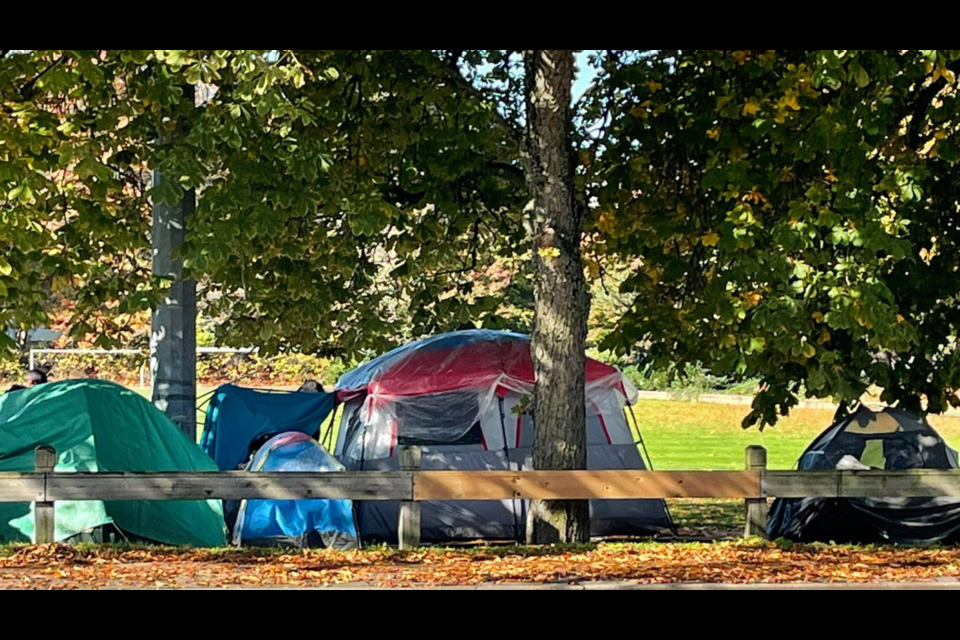I was surprised to see a grouping of three or four tents, lining the No. 3 Road edge of Brighouse Park, directly across from city hall. There they were, tucked in under the trees, just inside the fence. They looked very well organized and tidy, a tiny community making a home in the park. It was pouring rain the day I drove by, but city workers were cutting the grass and emptying the garbage cans. The trees were showing their fall colours, and despite the soggy weather and the small grouping of tents, the park was resplendent.
I shouldn’t have been surprised to see the tents; similar homes have been popping up around Richmond in recent months. I’ve seen single tents on the dyke near Dover Road, in the far corner of Minoru Park by the construction site along Minoru Road and hidden in a low-lying area near the city works yard off Westminster Highway.
While some make a link between homelessness and break-ins, if people without homes are keeping to themselves and there’s no evidence they’ve committed a crime, that is likely an unjustified leap.
Of course, everyone deserves to feel safe in their city. But that need for safety doesn’t only apply to those of us with homes. Homeless people deserve to feel safe too.
If the people living in tents in Brighouse Park are not bothering anyone or creating a lot of garbage or other problems, I think they should be left alone. If they cannot be left alone, we must provide a safe alternative place for them to pitch their tents in peace.
We are in a housing crisis and even people with steady jobs and good incomes are having a hard time finding homes to live in. While I wish there were homes for everyone – and I urge all governments to work towards that – today, there are not homes for all. People with low incomes or who are not able to work are having an even harder time.
Homelessness has almost doubled in Richmond, compared to three years ago, Richmond News reporter Maria Rantanen reported earlier this month. There were 162 homeless people in Richmond when the Point-in-Time count was done in March, and those staying outside of emergency shelters rose from 25 to 80 in the last three years, Rantanen reported.
These types of reports are a snapshot in time and are believed to report a minimum number of homeless people because not all homeless people will be found to be counted and the number is constantly changing. However, the 2023 Metro Vancouver count found nearly 5,000 homeless people, an increase of 32 per cent since 2020. About half live outside, and while most are adults aged 25 to 55, nearly one-quarter are seniors older than 55.
One-third are former youth in care, people who grew up without their parents. Two-thirds are men and 10 per cent have full-time jobs. One-third are Indigenous, while just two per cent of the general population are Indigenous, a stat that shouts out that colonization still exists.
People have nowhere to go and there is a shortage of affordable homes.
Though we live in Richmond, we all travel throughout Metro Vancouver, and can see that homelessness is increasing everywhere. In April, a tent city was cleared from East Hastings Street in Vancouver. In May, the Vancouver Sun reported that rest stops along Highway 1 in the Fraser Valley are jam-packed with homeless people, living in trailers.
The City of Richmond has a homelessness strategy, which includes this vision:
"By 2029, homelessness in Richmond will be rare, brief and non-recurring. Richmond is an inclusive community that works in collaboration to provide a continuum of housing and support services.”
This vision was created in 2019, but homelessness in Richmond has doubled since 2020, so clearly more needs to be done. Homelessness is the responsibility of all governments and cities certainly cannot solve it on their own.
To reach the vision, which still seems a long way off, Richmond pledges to prevent pathways to homelessness and provide pathways out of homelessness, support people who are homeless, encourage collaboration between community partners and monitor homelessness.
These seem like good strategies, but I would place one above all: Use empathy when dealing with people who are homeless. Remember the goal of supporting them and try to find ways to do that, rather than simply forcing them to clear out. Can the city provide somewhere for them to go, either a home they can afford or somewhere they can safely pitch their tent? If so, they should do that. If not, they need to leave them alone.
I will be keeping my eye on the tents at Brighouse Park. While I, of course, want Richmond to remain a safe city, with attractive, clean parks, I also want people who are homeless to have somewhere to hang their hats.
Tracy Sherlock is a freelance journalist who writes about education and social issues. Read her blog or email her [email protected].



